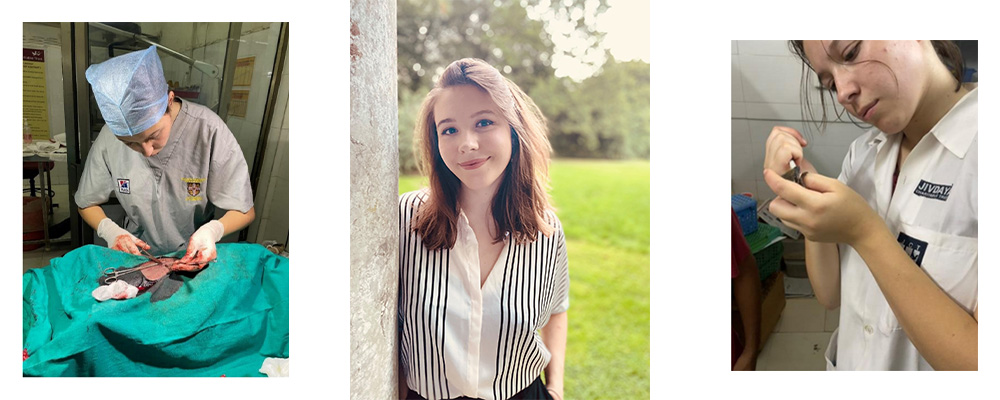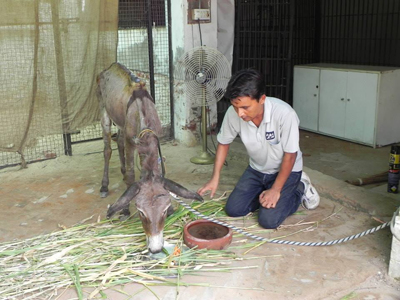Josie Brookes (SE 2018), a third-year veterinary student sponsored by the Jamie Netschert Fund, reflects on her clinical placement at Jivdaya Charitable Trust in India.

As veterinary students, our time at university revolves around learning the physiological, anatomical and clinical skills required from day one of our careers as competent vets. We are taught gold-standard approaches to caring for our patients but, at times, the constraints placed by finances, resources and time make it challenging to fully implement these approaches as intended. Clinical placements are crucial opportunities to grasp these realities. When in July of 2022 I was given the opportunity to travel to Ahmedabad, India, to complete a clinical placement at Jivdaya Charitable Trust, I discovered that veterinary care in India takes a rather different approach to what we are used to in the United Kingdom.
Access to veterinary care in India is very limited, so Gira Shah founded Jivdaya with her father in 2007 in an effort to provide free-of-cost treatment to stray animals ensuring that no living creature suffers unnecessarily. The clinic is run by a team of over 70 vets and volunteers who are responsible for the treatment of companion animals, wildlife and street dogs brought into their care.

Working alongside the clinicians at Jivdaya was both fascinating and, at times, slightly overwhelming. I found that a lot of the cases seen in this charity setting tended towards the extreme, but with multiple emergency cases at any one time, the vets were proficient at deciding which cases needed their immediate attention. I learnt that if a patient in critical condition is rushed straight into surgery, the chances of them coping with the general anaesthesia are slim. Instead, the initial priority is restoring any fluid deficits they may have and correcting any electrolyte abnormalities. This helps the patient become much better equipped to deal with the general anaesthesia required for surgery.
Another aspect of practice in Jivdaya that I enjoyed being involved with was their approach to the care of wildlife, which was strongly influenced by Jain attitudes and beliefs such as the avoidance of harm to living things. Their rehabilitation of raptors injured during Uttarayan, the kite flying festival, was particularly memorable. Across the few days that the festival takes place, Jivdaya admits thousands of birds with lacerations from kite strings and undertakes the laborious process of anaesthetising each patient to suture their wounds. Because Jainism prohibits euthanasia, when patients with little to no chance of recovery were admitted, Jivdaya provided them with supportive care until their diseases had run their course. However, with appropriate aftercare, most birds are often able to be released into the wild within a week or two. It was fascinating to see this rather different intersection of ethics and clinical practices, and it gave me a unique perspective to the converse arguments on euthanasia.
From the warmth of the welcome at Jivdaya, to their openness to discussion and willingness to teach, I could not have asked for a more enlightening few weeks. I have no doubt that my learning from this placement will echo down throughout my veterinary career. I would like to extend my gratitude and appreciation to Donna Netschert for establishing the Jamie Netschert Fund which provided funding for this placement, as it has been invaluable to me.


